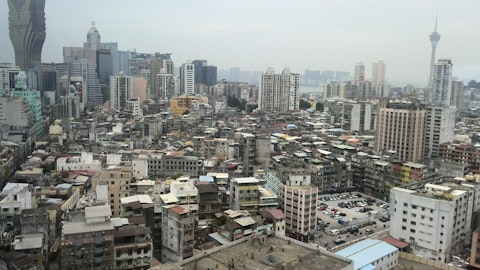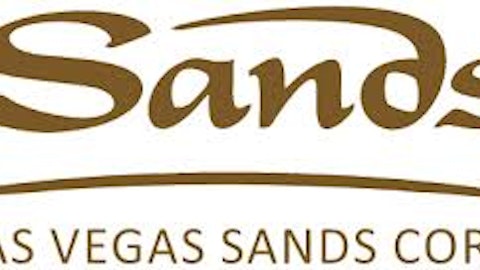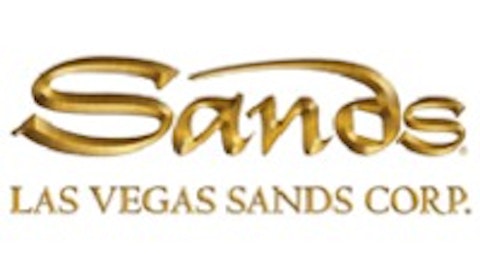Las Vegas Sands Corp. (NYSE:LVS) reported Q2 earnings of $0.60 per share on revenues of $2.92 billion versus expectations of earnings of $0.61 per share on revenues of $2.99 billion. Although Las Vegas Sands missed analysts’ expectations, the stock rallied after the report.

Due to a weak Chinese economy and the Chinese government’s crackdown on graft, Macau gaming revenues have been down for 13 straight months, with June gross gaming revenues down by 36.2% year-over-year. Since Las Vegas Sands derives the majority of its revenue and profit from Macau, its earnings and revenue have been off significantly year-over-year. Las Vegas Sands’ Q2 EPS decreased by 29.4% year-over-year, EBITDA decreased by 22.6% year-over-year, and revenue decreased by 19.4% year-over-year.
The good news is that Las Vegas Sands’ Macau Q2 numbers were better than its Q1 numbers. Q2 adjusted EBITDA from Macau was $559.8 million versus Q1’s $527.7 million. The stronger sequential numbers could be a sign that Macau is closer to the bottom than before. Analysts expect Macau revenues to trough this year, and to expand next year. Las Vegas Sands’ 2016 numbers should also benefit from the launch of the Parisian integrated resort that will increase Las Vegas Sands’ appeal to the mass demographic that the company needs to attract to offset the high-roller decline.
Overall, the company-wide consolidated EBITDA margin was steady, falling just 0.1% quarter-over-quarter to 34.8%. Singapore remains a bright spot. Although the Singapore Dollar declined versus the US dollar, Las Vegas Sands’ Marina Bay Sands reported an adjusted property EBITDA of $363.3 million, with the hold-normalized adjusted property EBITDA rising by 6.1% on a constant currency basis.
Hedge funds have been pretty divided on Las Vegas Sands Corp. (NYSE:LVS). Four of Las Vegas Sands’ top eight hedge fund shareholders either established a new position or increased their bullish position in the first quarter, while three hedge funds increased their bearish bets on the casino company. Jericho Capital Asset Management, Jabre Capital Partners, and HG Vora Capital Management all established new positions ,while Gotham Asset Management, Horizon Asset Management, and GAMCO Investors decreased their positions. Citadel Investment Group and Peak6 Capital Management adjusted their put and call positions between January 2 and March 31.
We mention the hedge fund shareholders of Las Vegas Sands because following hedge fund activity can generate alpha. Our research shows that the 15 most popular small-cap stocks among hedge funds have outperformed the market by nearly a percentage point per month between 1999 and 2012. We have been forward testing the performance of these stock picks since the end of August 2012, and they managed to return more than 123% over the ensuing 2.5+ years and outperformed the S&P 500 Index by over 66 percentage points (read the details here).
In our view, Las Vegas Sands Corp. (NYSE:LVS) is without question the best operator in Macau, with higher EBITDA and net revenue than competitors Wynn Resorts, Limited (NASDAQ:WYNN) and MGM Resorts International (NYSE:MGM). Las Vegas Sands is very shareholder-friendly. The company has returned over $11 billion in capital to its shareholders over the last 14 quarters, with its dividend increasing by 40% in 2012, 42.9% in 2013, and by 30% in 2014. Because of its dividend increases, Las Vegas Sands pays a dividend yield of 4.74%, almost double the ten year yield.
Management has also been buying back shares. The company bought $65 million in common stock at a weighted average price of $50.46 per share in the second quarter, retiring about 1.288 million shares. Given that Las Vegas Sands’ 52 week low was $49.57, it seems that the company could be intent on defending the $50 per share level. With $1.7 billion left in its share repurchase program, Las Vegas Sands has plenty of cash to support the level if it wants.
Although management has increased the dividend before, we don’t see the company raising its dividend until Macau bottoms. With a forward P/E of 19.7, shares are not cheap versus the S&P 500’s forward P/E of 18. We would wait on the sidelines until Macau bottoms before entering a position.
Disclosure: None





